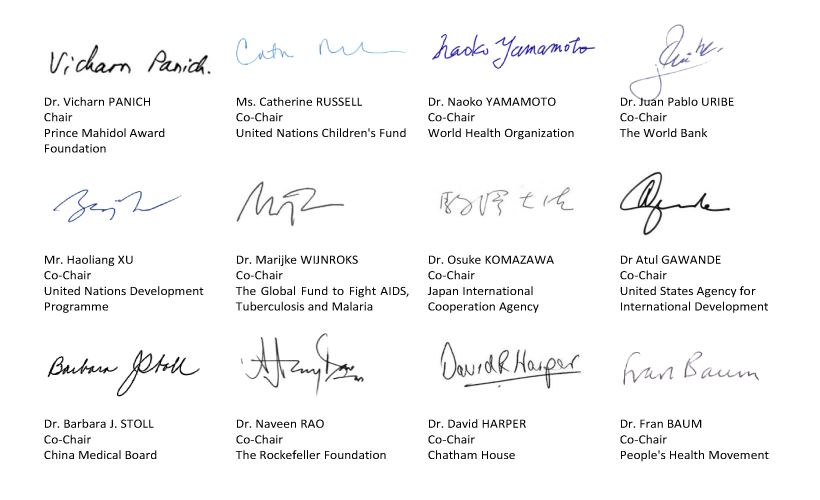Message from the Co-Chairs of the International Organizing Committee
We are facing unprecedented and cascading crises at a global scale. As the world attempts to grapple with the
health, social and economic impact of the COVID-19 pandemic, widening and deepening inequalities, and the
global energy and cost-of living-crises caused by the extraordinary political events of this year, the time to act
on the climate crisis is rapidly running out.
The triple planetary crisis – Climate Change, Biodiversity Loss, and Pollution – has been identified as the most
significant health threat of the 21st century. It endangers billions of lives and livelihoods across every continent
and threatens the very systems upon which we all depend.
The relationship between climate change, biodiversity loss, pollution and human health is complex. It threatens
our very existence, as human health and the health of the planet are fundamentally interlinked. It threatens
the essential ingredients of good health - clean air, safe drinking water, nutritious food supply, and security -
and it undermines decades of progress in global health, poverty alleviation and social development. This is
further exacerbated by political instability and ongoing conflict.
Additionally, areas that are predicted to be most affected by the climate crisis are also home to many of the
world’s poorest and vulnerable communities with limited options or resources to respond and adapt.
Climate change will profoundly affect the lives of every child born today. Current and future generations of
young people will suffer the burden of climate change, despite contributing the least to it.
We are deeply concerned about the climate crisis and the health of people and the health of our planet. Our
current response to mitigate the effects of the climate crisis is dramatically insufficient. We have reached a
‘code red’ for humanity. Time is crucial and we all must act now to reduce global greenhouse gas emissions
and to limit global warming to below 1.5°C to avoid irrevocable damages.
2022 marks the 30th anniversary of the UN Framework Convention on Climate Change, in which countries
agreed to prevent man-made climate change and its effects on human health. Yet, the primary source of
greenhouse gas emissions that drive climate change, along with other forms of air pollution, the burning of
fossil fuels, has changed very little in the past 30 years.
Countries have reached a historic decision at COP27, to establish a loss and damage fund to compensate
vulnerable nations, however COP 27 failed to meaningfully drive emissions cuts and to include the phasing out
of fossil fuels in the final decision text.
As global health leaders and practitioners, we have a responsibility and an obligation to amplify the voice of
reason, to support and advocate for the swift, decisive, and coherent intersectoral action and improved global
governance that will be essential to protect human health from the rapidly changing climate. We need to act
now to ensure that everyone has an opportunity to thrive while respecting the limits of the Earth’s resources.
The Conference this year will provide a unique platform to focus on the health impacts of the climate crisis. It provides an excellent opportunity for all stakeholders, including governments, the United Nations System, academic institutions, civil society organizations, professional associations, non-governmental and faith-based organizations, philanthropic foundations, youth activists and the private sector to come together to debate and discuss the most innovative and bold ideas, to propose solutions and forge partnerships to address the triple planetary crisis and its impact on human health at global, regional, national and local levels. Collectively, we have the responsibility and the chance to set a “New Health Agenda – at the Nexus of Climate Change, Environment and Biodiversity”, and to ensure that we are handing over to future generations a planet that is not only safe but also thriving, both ecologically and socially. As the Co-chairs of this very important global Conference, we would like to encourage all participants to take full advantage of all the opportunities that PMAC 2023 has to offer. In addition to your participation in the insightful Conference programme that includes plenary discussions and parallel sessions with many renowned speakers, we encourage you to take part in, share your challenges and ideas in an exciting range of pre- conference side meetings where many of the topics covered during the conference will be discussed in greater depth.
Appreciation
We would like to acknowledge and extend our appreciation to the many individuals and organizations, whose
tireless efforts helped bring the Conference to life. We especially thank the Prince Mahidol Award Foundation
and the Royal Thai Government for their exceptional support and leadership, as well as the PMAC Secretariat
for providing their overall guidance, day-to-day support, and an incredible team spirit.
We look forward to welcoming you to Bangkok!




